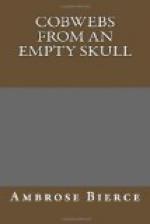Two hedgehogs having conceived a dislike to a hare, conspired for his extinction. It was agreed between them that the lighter and more agile of the two should beat him up, surround him, run him into a ditch, and drive him upon the thorns of the more gouty and unwieldy conspirator. It was not a very hopeful scheme, but it was the best they could devise. There was a chance of success if the hare should prove willing, and, gambler-like, they decided to take that chance, instead of trusting to the remote certainty of their victim’s death from natural cause. The doomed animal performed his part as well as could be reasonably expected of him: every time the enemy’s flying detachment pressed him hard, he fled playfully toward the main body, and lightly vaulted over, about eight feet above the spines. And this prickly blockhead had not the practical sagacity to get upon a wall seven feet and six inches high!
This fable is designed to show that the most desperate chances are comparatively safe.
CXXXI.
A young eel inhabiting the mouth of a river in India, determined to travel. Being a fresh-water eel, he was somewhat restricted in his choice of a route, but he set out with a cheerful heart and very little luggage. Before he had proceeded very far up-stream he found the current too strong to be overcome without a ruinous consumption of coals. He decided to anchor his tail where it then was, and grow up. For the first hundred miles it was tolerably tedious work, but when he had learned to tame his impatience, he found this method of progress rather pleasant than otherwise. But when he began to be caught at widely separate points by the fishermen of eight or ten different nations, he did not think it so fine.
This fable teaches that when you extend your residence you multiply your experiences. A local eel can know but little of angling.
CXXXII.
Some of the lower animals held a convention to settle for ever the unspeakably important question, What is Life?
“Life,” squeaked the poet, blinking and folding his filmy wings, “is—.” His kind having been already very numerously heard from upon the subject, he was choked off.
“Life,” said the scientist, in a voice smothered by the earth he was throwing up into small hills, “is the harmonious action of heterogeneous but related faculties, operating in accordance with certain natural laws.”
“Ah!” chattered the lover, “but that thawt of thing is vewy gweat blith in the thothiety of one’th thweetheart.” And curling his tail about a branch, he swung himself heavenward and had a spasm.
“It is vita!” grunted the sententious scholar, pausing in his mastication of a Chaldaic root.
“It is a thistle,” brayed the warrior: “very nice thing to take!”
“Life, my friends,” croaked the philosopher from his hollow tree, dropping the lids over his cattish eyes, “is a disease. We are all symptoms.”




